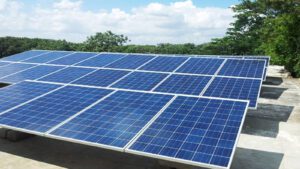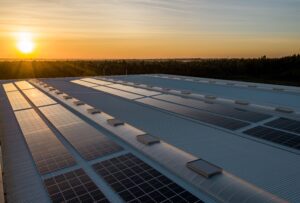
Singapore is a highly developed city-state with a growing demand for renewable energy. With limited land and no natural resources, the government has taken various initiatives to promote renewable energy adoption among businesses and households. In this article, we will explore some of the innovative programs launched by the government to increase the use of solar energy in the city-state.
Power Purchase Agreement (PPA)
The Power Purchase Agreement (PPA) is an innovative program that allows businesses to easily adopt solar energy. Under this scheme, businesses can sign a contract with a solar energy provider to purchase solar energy at a fixed rate for a fixed period of time. The solar energy provider is responsible to install and maintain the solar panels, and the customer, in return, commits to paying for the electricity generated at a fixed rate for a specific period of time. This program is especially beneficial for businesses that do not have the resources to invest in their own solar panels.
The PPA program has gained popularity in Singapore due to its simplicity and cost-effectiveness. Businesses can save on energy costs and reduce their carbon footprint by adopting solar energy. The program is also scalable, which means that it can be used by businesses of all sizes.
Solar Roof Rental Scheme

The Solar Roof Rental Scheme is another innovative program launched by the government to promote renewable energy adoption among businesses. Under this scheme, businesses can rent out their roof space for green energy generation, which is managed entirely by the solar company. The businesses have the option to purchase the generated electricity for their building.
This program is especially beneficial for businesses that do not have the capital to invest in their own solar panels. The solar company installs and maintains the solar panels, and the business pays for the electricity generated at a fixed rate. This program is also scalable, which means that it can be used by businesses of all sizes.
Solar Renewable Energy Certificates (SRECs)
Solar Renewable Energy Certificates (SRECs) are a way for individuals and businesses to generate revenue by installing solar energy systems. SRECs are certificates that represent the environmental attributes of a solar energy system. When a solar energy system generates one megawatt-hour of electricity, it earns one SREC.
SRECs can be sold on the open market, and the price of an SREC is determined by supply and demand. By installing solar energy systems, individuals and businesses can generate SRECs and sell them on the open market. This provides an additional source of revenue for those who invest in solar energy systems.
Government Programs and Incentives
- SolarNova Programme: Encourages solar adoption in public sector buildings and spaces.
- Grants and Subsidies: Seek out grants from agencies like the Singapore Economic Development Board (EDB) or the Building and Construction Authority (BCA).
Corporate Tax Credits
Corporate Tax Credits are another way to incentivize businesses to adopt solar energy. In South Carolina, businesses can get a corporate tax credit of $3,500 or 50% of a businesses’ tax liability, whichever is lower, for each facility with solar. These credits in excess of $3,500 can carry forward for up to 10 years.
This program is especially beneficial for businesses that have a high tax liability. By investing in solar energy, businesses can reduce their tax liability and save on energy costs. The program also provides an additional source of revenue for businesses that generate excess energy.
Community Solar
Community Solar is a program that allows individuals and businesses to invest in a solar energy project located in their community. The program is especially beneficial for individuals and businesses that do not have the resources to invest in their own solar panels.
Under this program, individuals and businesses can purchase a share in a solar energy project and receive credit on their energy bill for the electricity generated by their share. This program also provides an additional source of revenue for those who invest in solar energy.
To make Community Solar successful, it is essential for companies to follow best practices. This includes helping people understand what the program offers, providing clear information on the financial benefits, and making it easy to participate.
Monetization Strategies
Selling Excess Power
- Grid Contribution: Sell excess electricity generated back to the grid under Singapore’s net metering or other similar schemes.
Carbon Credits and Trading
- Generate Carbon Credits: By reducing emissions, businesses can earn carbon credits which can be traded on carbon markets.
Enhanced Property Value
- Increased Real Estate Value: Properties with solar installations can see an increase in value.
Green Branding and Marketing
- Leverage Sustainability: Use the adoption of solar energy as a part of corporate social responsibility (CSR) initiatives to enhance brand value and appeal to eco-conscious consumers and investors.
Government Incentives
- Tax Benefits and Rebates: Businesses may qualify for tax rebates or benefits for adopting renewable energy.
Conclusion
In recent years, the world has been waking up to the importance of renewable energy sources. As the effects of climate change become increasingly evident, countries are looking for ways to reduce their carbon footprint and transition to more sustainable energy systems. One country that has been making significant strides in this regard is Singapore. With its limited land area and high population density, Singapore faces unique challenges when it comes to renewable energy. However, the city-state has been actively exploring innovative solutions to meet its increasing demand for clean energy.
One such solution is the Power Purchase Agreement (PPA). PPAs allow businesses in Singapore to easily adopt solar energy. A PPA is a contract between a solar energy provider and a business that allows the business to purchase solar energy at a fixed rate for a fixed period of time. This allows businesses to save on energy costs and reduce their carbon footprint. The PPA model has been successful in other countries, and it has the potential to make a significant impact in Singapore as well.
The Solar Roof Rental Scheme is another innovative solution that has been gaining traction in Singapore. This scheme allows businesses to rent out their roof space for green energy generation. The solar company manages the entire process, from installation to maintenance, and businesses have the option to purchase the generated electricity for their building. This arrangement allows businesses to take advantage of solar energy without having to invest in the equipment themselves. It also allows them to contribute to Singapore’s efforts to reduce its carbon footprint.
Solar Renewable Energy Certificates (SRECs) are a way for individuals and businesses to generate revenue by installing solar energy systems. When someone installs a solar energy system, they can generate SRECs, which can be sold on the open market. The sale of SRECs provides an additional source of income for individuals and businesses who have invested in renewable energy. This incentivizes the adoption of solar energy and helps to drive demand for renewable energy systems.
Community solar is another solution that is gaining popularity in Singapore. Community solar allows multiple individuals and businesses to share a solar energy system. This allows people who cannot install solar panels on their property, such as renters, to still benefit from solar energy. Companies in community solar can help answer the calls by following best practices, such as helping people understand what the program offers, and ensuring that the customer knows what they are signing up for. This ensures that everyone benefits from the system and understands their role in making the program successful.
In conclusion, Singapore has been making significant strides in the adoption of renewable energy. The city-state has been exploring innovative solutions, such as PPAs, solar roof rental schemes, SRECs, corporate tax credits, and community solar. These solutions allow businesses and individuals to benefit from solar energy without having to invest in equipment themselves, and they provide multiple benefits, including reducing energy costs, helping companies become more sustainable, and reducing the carbon footprint of the city-state. As Singapore continues to explore new solutions and partnerships, it is well on its way to achieving its goals of becoming a sustainable and resilient city.